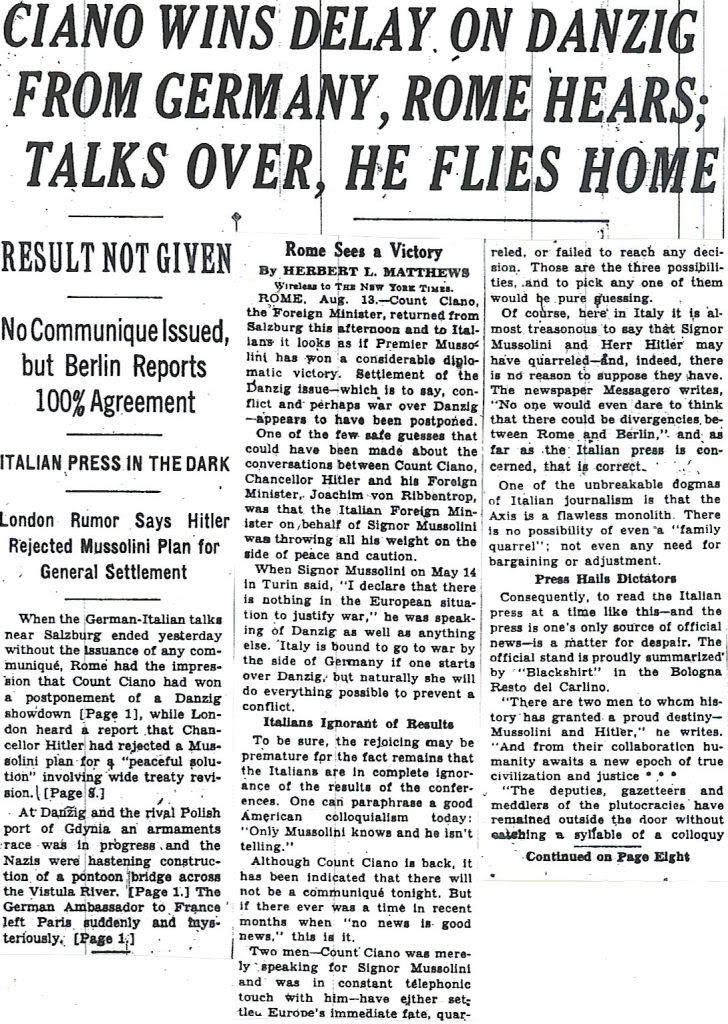
Posted on 08/14/2009 5:16:20 AM PDT by Homer_J_Simpson

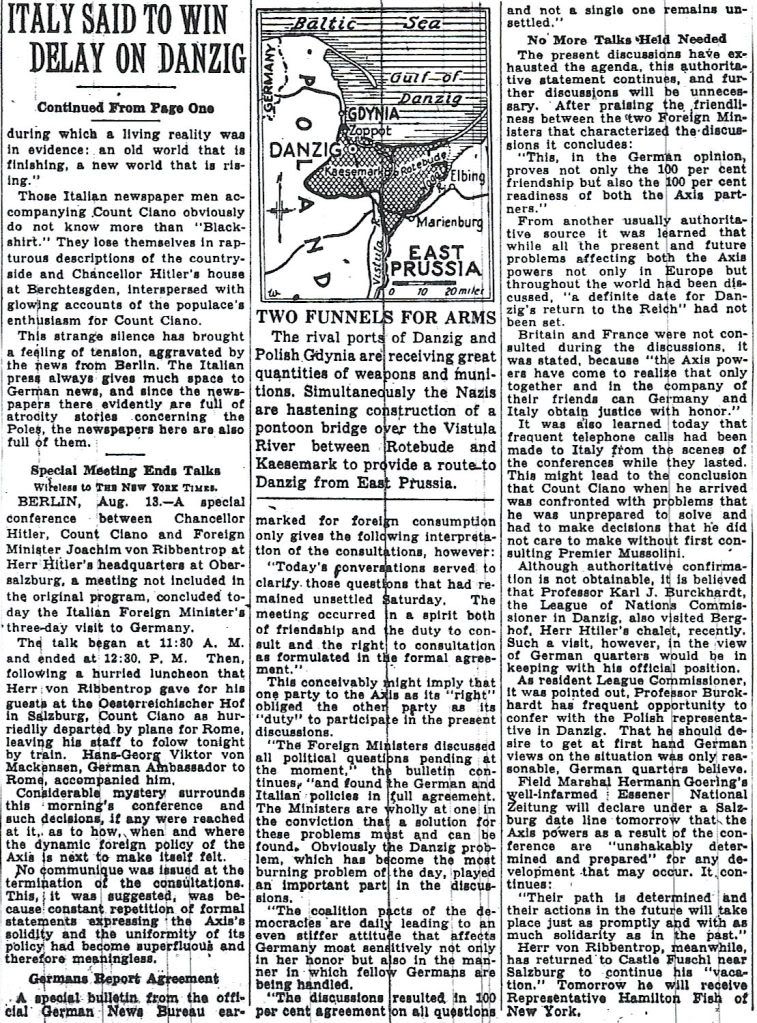
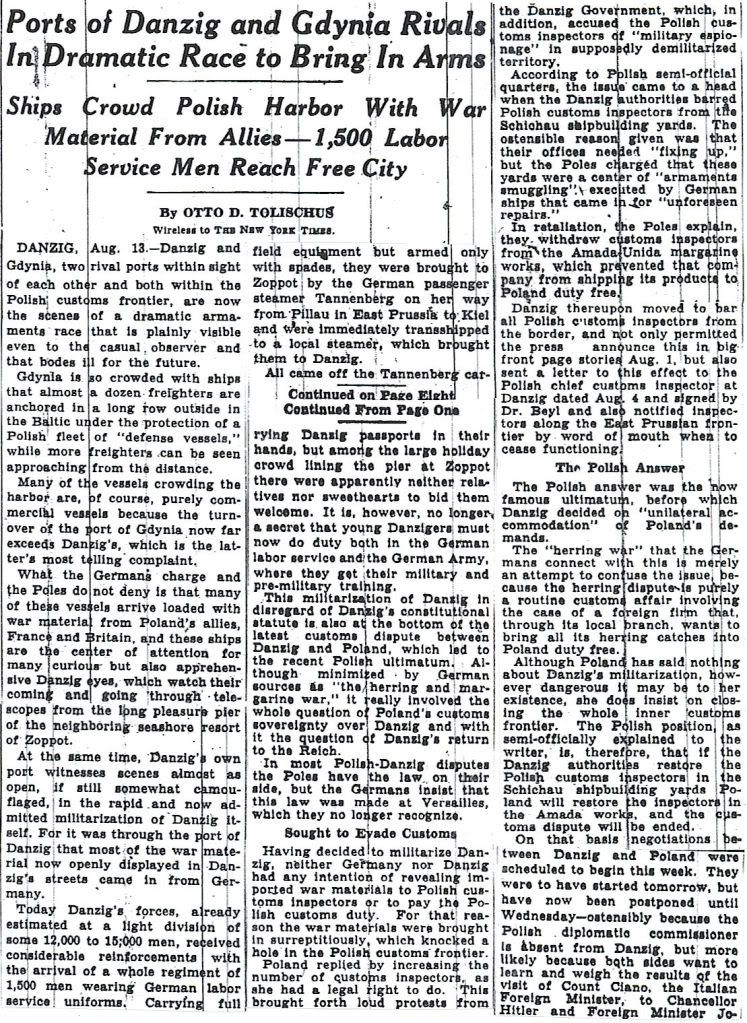
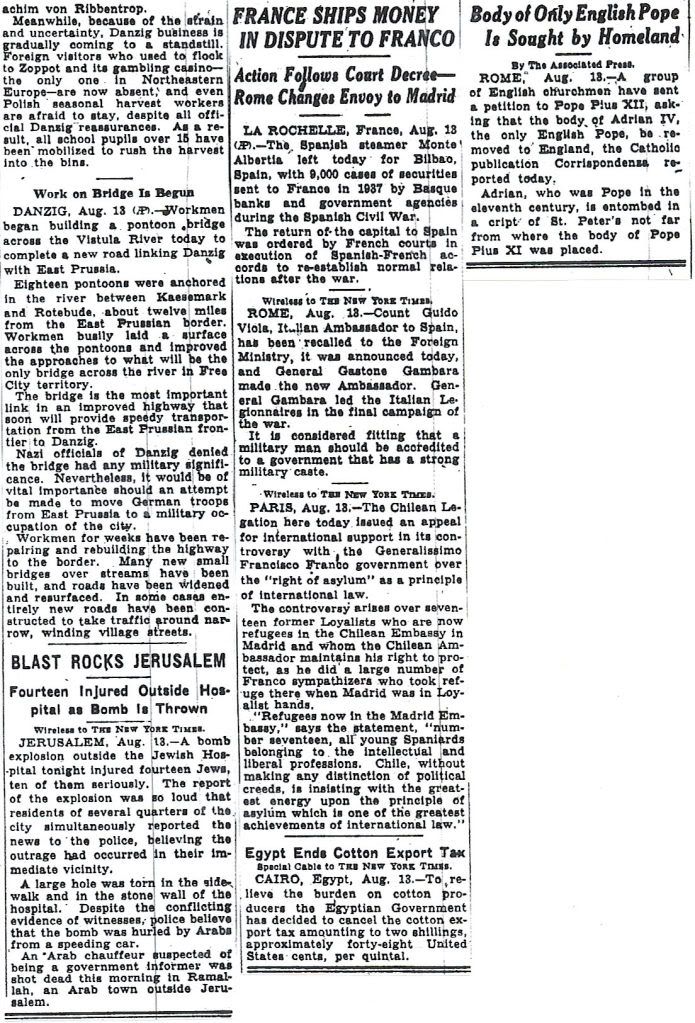
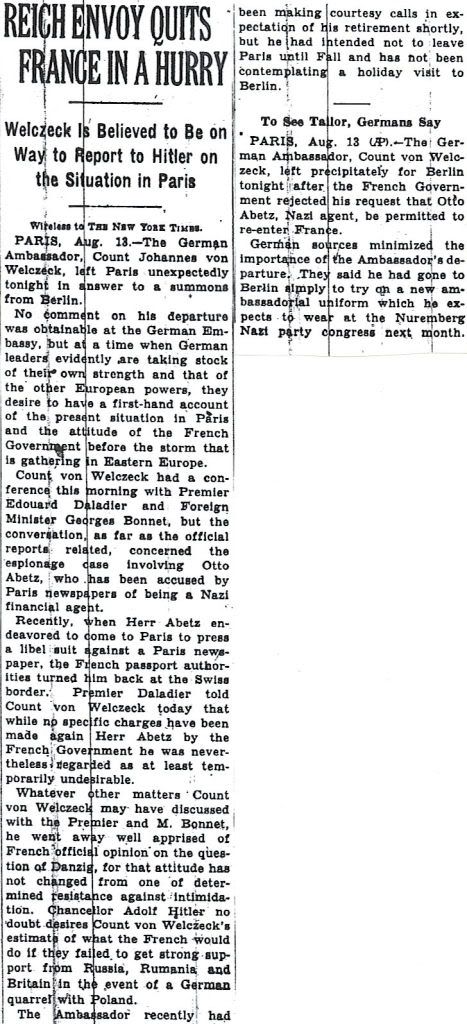
This, finally, was Hitler's great bid. German-Russian relations, said Ribbentrop, had "come to a historic turning point . . . There exist no real conflicts of interests between Germany and Russia ... It has gone well with both countries previously when they were friends and badly when they were enemies."
The crisis which has been produced in Polish-German relations by English policy [Ribbentrop continued] and the attempts at an alliance which are bound up with that policy, make a speedy clarification of German-Russian relations necessary. Otherwise matters . . . might take a turn which would deprive both Governments of the possibility of restoring German-Russian friendship and in due course clarifying jointly territorial questions in Eastern Europe. The leadership of both countries, therefore, should not allow the situation to drift, but should take action at the proper time. It would be fatal if, through mutual ignorance of views and intentions, the two peoples should finally drift apart.
The German Foreign Minister, "in the name of the Fuehrer," was therefore prepared to act in proper time.
As we have been informed, the Soviet Government also feel the desire for a clarification of German-Russian relations. Since, however, according to previous experience this clarification can be achieved only slowly through the usual diplomatic channels, I am prepared to make a short visit to Moscow in order, in the name of the Fuehrer, to set forth the Fuehrer's views to M. Stalin. In my view, only through such a direct discussion can a change be brought about, and it should not be impossible thereby to lay the foundations for a final settlement of German-Russian relations.
The British Foreign Secretary had not been willing to go to Moscow, but now the German Foreign Minister was not only willing but anxious to go—a contrast which the Nazis calculated quite correctly would make an impression on the suspicious Stalin. The Germans saw that it was highly important to get their message through to the Russian dictator himself. Ribbentrop therefore added an "annex" to his urgent telegram.
I request [Ribbentrop advised Schulenburg] that you do not give M. Molotov these instructions in writing, but that they reach M. Stalin in as exact a form as possible and I authorize you, if the occasion arises, to request from M. Molotov on my behalf an audience with M. Stalin, so that you may be able to make this important communication directly to him also. In addition to a conference with Molotov, a detailed discussion with Stalin would be a condition for my making the trip.
There was a scarcely disguised bait in the Foreign Minister's proposal which the Germans, not without reason, must have thought the Kremlin would rise to. Reiterating that "there is no question between the Baltic Sea and the Black Sea which cannot be settled to the complete satisfaction of both counties," Ribbentrop specified "the Baltic States, Poland, southeastern questions, etc." And he spoke of the necessity of "clarifying jointly territorial questions of Eastern Europe."
Germany was ready to divide up Eastern Europe, including Poland, with the Soviet Union. This was a bid which Britain and France could not—and, obviously, if they could, would not—match. And having made it, Hitler, apparently confident that it would not be turned down, once more—on the same day, August 14—called in the commanders in chief of his armed forces to listen to him lecture on the plans and prospects for war.
William L. Shirer, The Rise and Fall of the Third Reich
"The great drama," Hitler told his select listeners, "is now approaching its climax." While political and military successes could not be had without taking risks, he was certain that Great Britain and France would not fight. For one thing, Britain "has no leaders of real caliber. The men I got to know at Munich are not the kind that start a new world war." As at previous meetings with his military chiefs, the Fuehrer could not keep his mind off England and he spoke in considerable detail of her strengths and weaknesses, especially the latter.
England [Halder noted down the words], unlike in 1914, will not allow herself to blunder into a war lasting for years . . . Such is the fate of rich countries . . . Not even England has the money nowadays to fight a world war. What should England fight for? You don't get yourself killed for an ally.
What military measures, Hitler asked, could Britain and France undertake?
Drive against the West Wall unlikely [he answered]. A northward swing through Belgium and Holland will not bring speedy victory. None of this would help the Poles.
All these factors argue against England and France entering the war . . . There is nothing to force them into it. The men of Munich will not take the risk . . . English and French general staffs take a very sober view of the prospects of an armed conflict and advise against it. . . .
All this supports the conviction that while England may talk big, even recall her Ambassador, perhaps put a complete embargo on trade, she is sure not to resort to armed intervention in the conflict.
So Poland, probably, could be taken on alone, but she would have to be defeated "within a week or two," Hitler explained, so that the world could be convinced of her collapse and not try to save her.
Hitler was not quite ready to tell his generals just how far he was going that very day to make a deal with Russia, though it would have immensely pleased them, convinced as they were that Germany could not fight a major war on two fronts. But he told them enough to whet their appetite for more.
"Russia," he said, "is not in the least disposed to pull chestnuts out of the fire." He explained the "loose contacts" with Moscow which had started with the trade negotiations. He was now considering whether "a negotiator should go to Moscow and whether this should be a prominent figure." The Soviet Union, he declared, felt under no obligation to the West. The Russians understood the destruction of Poland. They were interested in a "delimitation of spheres of interest." The Fuehrer was "inclined to meet them halfway."
In all of Halder's voluminous shorthand notes on the meeting there is no mention that he, the Chief of the Army's General Staff, or General von Brauchitsch, its Commander in Chief, or Goering questioned the Fuehrer's course in leading Germany into a European conflict—for despite Hitler's confidence it was by no means certain that France and Britain would not fight nor that Russia would stay out. In fact, exactly a week before, Goering had received a direct warning that the British would certainly fight if Germany attacked Poland.
William L. Shirer, The Rise and Fall of the Third Reich
August 14. – I find Mussolini worried. I do not hesitate to arouse in him every possible anti-German reaction by every means in my power. I speak to him of his diminished prestige and his playing the role of second fiddle. And, finally, I turn over to him documents which prove the bad faith of the Germans on the Polish question. The alliance was based on premises which they now deny; they are traitors and we must not have any scruples in ditching them. But Mussolini still has many scruples.
William L. Shirer, The Rise and Fall of the Third Reich
Ports of Danzig and Gdynia Rivals In Dramatic Race to Bring In Arms – 3
Blast Rocks Jerusalem – 4
France Ships Money in Dispute to Franco – 4
Body of Only English Pope Is Sought by Homeland – 4
Reich Envoy Quits France in a Hurry – 5
Update on Nazi- Soviet negotiations at reply #2.
Update on German military conference at reply #3.
Ciano’s diary update at reply #4.
Darned Methodists were at it even back then.
And what, then, is the good Count’s ultimate fate??
Hint: Ciano's final diary entry can be found at reply #3 on my 8/11/39 post.
Yes, you can trust Hitler to leave Danzig alone... *snicker*
Ambassador von der Schulenburg saw Molotov at 8 P.M. on August 15 and, as instructed read to him Ribbentrop’s urgent telegram stating that the Reich Foreign Minister was Prepared to come to Moscow to settle Soviet-German relations. According to a “most urgent, secret” telegram which the German envoy got off to Berlin later that night, the Soviet Foreign Commissar received the information “with the greatest interest” and “warmly welcomed German intentions of improving relations with the Soviet Union.” However, expert diplomatic poker player that he was, Molotov gave no sign of being in a hurry. Such a trip as Ribbentrop proposed, he suggested, “required adequate preparation in order that the exchange of opinions might lead to results.”
What results? The wily Russian dropped some hints. Would the German government, he asked, be interested in a nonaggression pact between the two countries? Would it be prepared to use its influence with Japan to improve Soviet-Japanese relations and “eliminate border conflicts”? – a reference to an undeclared war which had raged all summer on the Manchurian-Mongolian frontier. Finally, Molotov asked, how did Germany feel about a joint guarantee of the Baltic States?
All such matters, he concluded, “must be discussed in concrete terms so that, should the German Foreign Minister come here, it will not be a matter of an exchange of opinions but of making concrete decisions.” And he stressed again that “adequate preparation of the problems is indispensable.”
The first suggestion, then, for a Nazi-Soviet nonaggression pact came from the Russians – at the very moment they were negotiation with France and Great Britain to go to war, if necessary, to oppose further German aggression. Hitler was more than willing to discuss such a pact “in concrete terms,” since its conclusion would keep Russia out of the war and enable him to attack Poland without fear of Soviet intervention. And with Russia out of the conflict he was convinced that Britain and France would get cold feet.
William L. Shirer, The Rise and Fall of the Third Reich
August 15. – The Duce . . . is convinced that we must not march blindly with the Germans. However . . . he wants time to prepare the break with Germany . . . He is more and more convinced that the democracies will fight . . . This time it means war. And we cannot engage in war because our plight does not permit us to do so.
William L. Shirer, The Rise and Fall of the Third Reich
Beginning at the angle of the Rhine near Lauterbourg, we traversed the whole section to the Swiss frontier. In England, as in 1914, the carefree people were enjoying their holidays and playing with their children on the sands. But here along the Rhine a different light glared. All the temporary bridges across the river had been removed to one side or the other. The permanent bridges were heavily guarded and mined. Trusty officers were stationed night and day to press at a signal the buttons which would blow them up. The great river, swollen by the melting Alpine snows, streamed along in sullen, turgid flow. The French outposts crouched in their rifle-pits amid the brushwood. Two or three of us could stroll together to the water’s edge, but nothing like a target, we were told, must be presented. Three hundred yards away on the farther side, here and there among the bushes, German figures could be seen working rather leisurely with pick and shovel at their defences. All the riverside quarter of Strasbourg had already been cleared of civilians. I stood on its bridge for some time and watched one or two motor-cars pass over it. Prolonged examination of passports and character took place at either end. Here the German post was little more than a hundred yards away from the French. There was no intercourse between them. Yet Europe was at peace. There was no dispute between Germany and France. The Rhine flowed on, swirling and eddying, at six or seven mile an hour. One or two canoes with boys in them sped past on the current. I did not see the Rhine again until more than five years later, in March 1945, when I crossed it in a small boat with Field-Marshal Montgomery. But that was near Wesel, far to the north.
On my return I sent a few notes of what I had gathered to the Secretary of State for War, and perhaps to some other Ministers with whom I was in touch:
The French Front cannot be surprised. It cannot be broken at any point except by an effort which would be enormously costly in life, and would take so much time that the general situation would be transformed while it was in progress. The same is true, thought to a lesser extent, of the German side.
The flanks of this front however rest upon two small neutral States. The attitude of Belgium is thought to be profoundly unsatisfactory. At present there are no military relations of any kind between the French and the Belgians.
At the other end of the line, about which I was able to learn a good deal, the French have done everything in their power to prepare against an invasion through Switzerland. This operation would take the form of a German advance up the Aar, protected on its right by a movement into or towards the Belfort Gap. I personally think it extremely unlikely that any heavy German attempt will be made either against the French Front or against the two small countries on its flanks in the opening phase.
It is not necessary for Germany to mobilize before attacking Poland. They have enough divisions already on a war footing to act upon their eastern front, and would have time to reinforce the Siegfried Line by mobilizing simultaneously with the beginning of a heavy attack on Poland. Thus a German mobilization is a warning signal which may not be forthcoming in advance of war. The French, on the other hand, may have to take extra measures in the period of extreme tension now upon us.
As to date, it is thought Hitler would be wise to wait until the snow falls in the Alps and gives the protection of winter to Mussolini. During the first fortnight of September, or even earlier, these conditions would be established. There would still be time for Hitler to strike heavily at Poland before the mud period of late October or early November would hamper a German offensive there. Thus this first fortnight in September seems to be particularly critical, and the present German arrangements for the Nuremberg demonstration – propaganda, etc. – seem to harmonise with such a conclusion.
What was remarkable about all I learned on my visit was the complete acceptance of the defensive which dominated my most responsible French hosts, and imposed itself irresistibly upon me. In talking to all these highly competent French officers one had the sense that the Germans were the stronger, and that France had no longer the life-thrust to mount a great offensive. She would fight for her existence - Voila tout! There was the fortified Siegfried Line, with all the increased fire-power of modern weapons. In my own bones, too, was the horror of the Somme and Passchendaele offensives. The Germans were of course far stronger than in the days of Munich. We did not know the deep anxieties which rent their High Command. We had allowed ourselves to get into such a condition, physically and psychologically, that no responsible person – and up to this point I had no responsibilities – could act on the assumption – which was true – that only forty-two half-equipped and half-trained German divisions guarded their long front from the North Sea to Switzerland. This compared with thirteen at the time of Munich.
Winston S. Churchill, The Gathering Storm
if Ciano was right about Mussolini, Italy would likely still be a fascist country, or at least would have been for years after the War, and there likely would have been only a small Africa campaign, if France fell, to take Algeria and Morocco.
But Il Duce waffles.
And ends up on the griddle!
Disclaimer: Opinions posted on Free Republic are those of the individual posters and do not necessarily represent the opinion of Free Republic or its management. All materials posted herein are protected by copyright law and the exemption for fair use of copyrighted works.